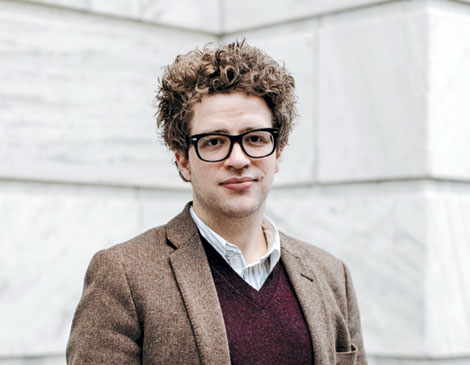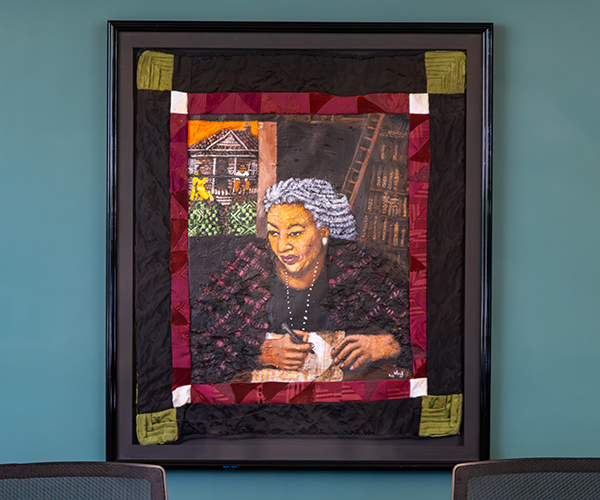Dave Lucas always saw the poetry in Northeast Ohio — from the elephant boneyard of the industrial Flats to Lake Erie’s near-Biblical mystique. The Mentor poet and Brews and Prose co-founder knows, however, that not many share that view.
“I grew up in a generation where the idea of being in Cleveland was perhaps the most anti-poetic thing you could think of,” says Lucas. As Ohio’s new poet laureate (only the second in state history), the 37-year-old hopes to make the form more accessible by finding the poetry in what already surrounds us.
“Even if one isn’t reading a book of poems in the way that my book is,” says Lucas, who teaches a Poetry for People Who Hate Poetry class at Case Western Reserve University, “one is still encountering and living in poetry all the time.”
We jump-start his mission by examining “Midst of a Burning Fiery Furnace,” which was inspired by the city and appeared in his 2011 book, Weather.
Midst of a Burning Fiery Furnace1,2
Let the foundries burn the whole city then.
Black the edges and the brazen joints.3
Let the salamander sleep in his well of flame.4
Because the worst has happened, and yet5
so much more remains to be burnt,
smelt and milled and cast. These remains.6
Suppose this blistered city would smolder
well after all those who live by the blast
of the furnace have left themselves to ash.
I have heard of that alchemy of steel —
I am familiar with the dying arts. Let them burn7
the dark night livid, my poor republic
of ingot and slag. I am also seething
in my depths, I too have come to forge.8
1. The title pays homage to the Flats with a Biblical allusion to Shadrach, Meshach and Abednego, the Hebrew men who survived being thrown into a fiery furnace. It also calls to mind Clevelanders’ resilient spirit. “I like the idea of something that lives in the fire, is at home in it, that goes into and comes out of it. I wrote that poem before I watched Game of Thrones, but Khaleesi coming out of the fire was a familiar image to me,” he says.
2. The poem was written in the summer of 2010 when civic morale had cratered after LeBron James left for the Miami Heat. Defiant, the poem attempts to flip the script. “It has to do with the impulse to write about the Mistake by the Lake in an ennobling, mythologizing way, to understand why so much of what I was looking at around me seemed majestic.”
3. “I really love those [industrial Flats East Bank] streets down by the river,” Lucas says. “You see what the city was in its glory days. You see how the river was the basis for the city in the first place.”
4. Ancient peoples believed that salamanders lived in fire because of the reptile’s tendency to nest in wood later used for tinder. When the fire was lit, the lizards would run out of the flames, giving weight to the belief.
5. The line serves as a retort to swipes at Cleveland such as Forbes naming it America’s most miserable city. “I’m not sure what the ‘worst’ is necessarily in this poem, but it seemed to have happened. But there’s always something that comes after.”
6. Beyond fire’s association with our foundries and river, Lucas liked how it could be a metaphor of decline and rebirth. “There’s a sense of both destruction and creation in the same image, the same phenomenon. Even in the creation of steel, you’re destroying something and heating it to a point where it becomes something new.”
7. Lucas notes how the city’s supposedly dying industry evokes how many feel about poetry. “To be from a ‘dying city,’ practicing a ‘dying art’ is something that’s very freeing, because it allows you to speak defiantly,” he says. “What I’m writing about and defying in that poem might be different than what somebody else is trying to defy in terms of their own narrative about this city or who they are.”
8. Looking back, Lucas finds this line too “grandiose.” But it’s hard not to see the parallels today, as Lucas prepares to “forge” something new as poet laureate. “I mean that line in the sense of What now?” he says. “Well, now you start again. I was emboldened and that moment of starting again is something that would be consistent not just for Cleveland or poets, but generally. You experience something profound, and whether it’s good or bad, you start again.”




